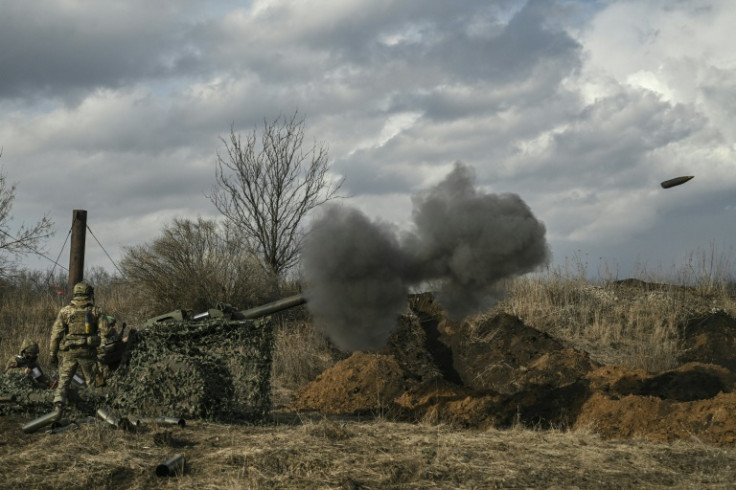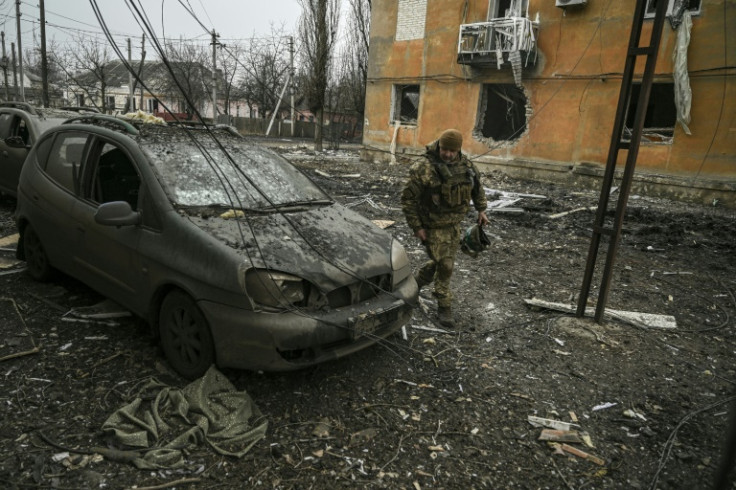Ukraine Army Has Now Eliminated Almost 160,000 Russian Soldiers Since Start Of War: UAF

KEY POINTS
- A total of 159,800 Russian casualties have been recorded in Ukraine
- Russia has also lost 3,474 tanks, among other pieces of equipment
- Russia's main focus continues to be the city of Bakhmut in Ukraine's east
Russia has suffered nearly 160,000 military casualties in its ongoing invasion of Ukraine, data provided by Ukraine's Armed Forces (UAF) showed.
A total of 159,800 Russian personnel have been eliminated since the conflict began more than a year ago, the UAF's General Staff said in its most recent casualty report released Monday.
Russia also lost within the same period 3,474 tanks, 6,774 armored fighting vehicles and 2,503 artillery systems, among other pieces of military equipment.
International Business Times could not independently verify the figures from the Ukrainian military.
"Life is a storm, my young friend. You will bask in the sunlight one moment, be shattered on the rocks the next. What makes you a man is what you do when that storm comes."
— Defense of Ukraine (@DefenceU) March 13, 2023
Alexandre Dumas
Total combat losses of the enemy from February 24, 2022 to March 13, 2023: pic.twitter.com/IKA52QgZlE
Fighting in Ukraine's partially Russian-occupied eastern province of Donetsk has become "very tough" and "very painful," according to Ukrainian President Volodymyr Zelensky.
"We have to destroy the enemy's military power. And we shall destroy it," the Ukrainian head of state said in a video address late Monday, Reuters reported.
The city of Bakhmut in Donetsk has become the main focus of Russia's assault in recent months, but Russian forces, including fighters from the Wagner Group paramilitary organization, have been unable to completely encircle the settlement.
While Bakhmut's Ukrainian defenders have been able to hold out, they were reportedly suffering significant losses as well.
The Ukrainian government has maintained its position to defend Bakhmut, with Zelensky claiming the city's fall would provide Russian forces an "open road" to neighboring settlements such as Kramatorsk and Slovyansk.
"This is tactical for us. We understand what Russia wants to achieve there. Russia needs at least some victory - a small victory - even by ruining everything in Bakhmut, just killing every civilian there," Zelensky said.
However, U.S. Secretary of Defense Lloyd Austin said on March 6 that Bakhmut's true worth was more symbolic than strategic.
"The fall of Bakhmut won't necessarily mean that the Russians have changed the tide of this fight," Austin told reporters while he was visiting Jordan.
Against the backdrop of the fighting in Bakhmut, a rivalry between Wagner Group founder Yevgeny Prigozhin and the Russian Ministry of Defense (MoD) "may have reached a boiling point" over the city, according to the U.S.-based Institute for the Study of War (ISW) think tank.
Prigozhin, an oligarch known to be an ally of Russian President Vladimir Putin, is believed to have convinced the latter that he would be able to seize Bakhmut if given access to the Russian MoD's ammunition stocks and was allowed to expand his recruitment campaigns to include regular Russians and prisoners.
However, Putin had already allowed the Russian military to retake control of the Bakhmut direction from Prigozhin by January as the Wagner Group failed to deliver its promised victory.
Russian military leadership may now be trying to expend Wagner Group forces and Prigozhin's influence in Bakhmut.
Both Putin and the Russian military "may use Prigozhin as a scapegoat for the costly drive on Bakhmut once the offensive culminates," the ISW said.

© Copyright IBTimes 2025. All rights reserved.





















